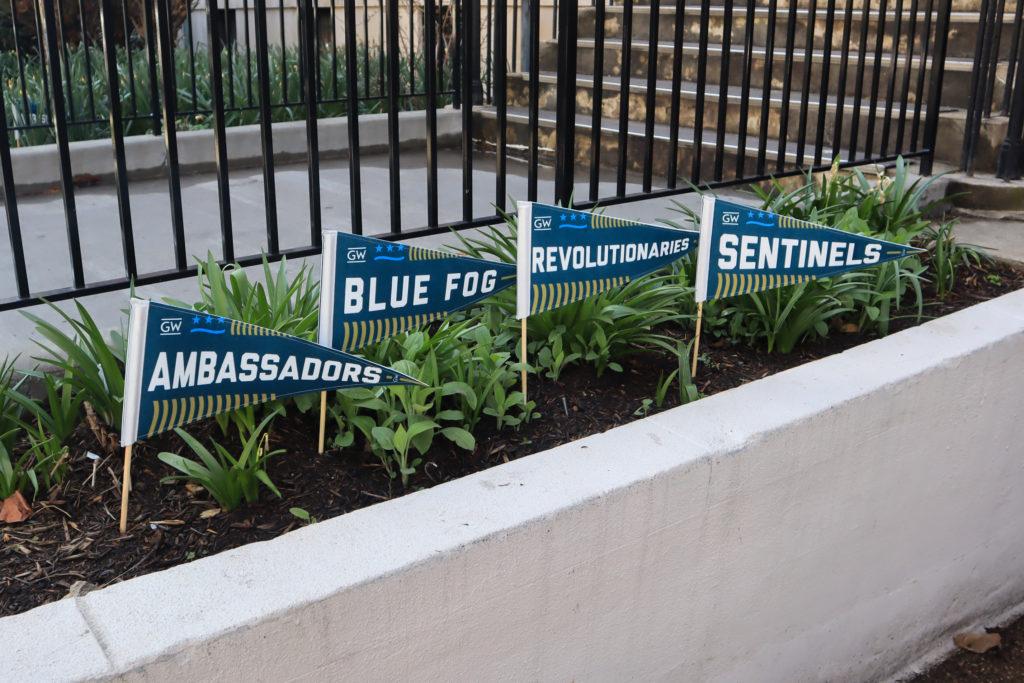From military might to marine mist, the branding of the University’s future remains split between a quartet of GW-inspired monikers.
Officials selected Ambassadors, Blue Fog, Revolutionaries and Sentinels as the four finalists for GW’s next moniker last month as they narrow down a University-wide brainstorm to replace the now-retired and controversial Colonials moniker. While Revolutionaries and Sentinels harken back to the Continental Army and the University’s namesake, George Washington, Blue Fog and Ambassadors would forge ties to the Foggy Bottom Campus and GW’s international affairs prestige.
While University spokesperson Julia Metjian declined to comment on the history behind each of the moniker finalists, The Hatchet explored the history and GW-inspired identities of each of the final picks through interviews with two American history professors.
Ambassadors
Denver Brunsman, a professor of history, said Ambassadors fits the University because of GW’s proximity to foreign embassies, as well as the role of the Elliott School of International Affairs as a “training ground” for future ambassadors. The Mexican, Icelandic, Saudi Arabian and Spanish embassies are all within blocks of the Foggy Bottom Campus.
At least 86 GW alumni have served as ambassadors of countries including China, the Dominican Republic and Norway, according to a Hatchet analysis of notable GW alumni.
He said Ambassadors does not relate back to the University’s namesake, George Washington, because he never served as an ambassador.
“I don’t think that it has much connection to George Washington,” Brunsman said. “He was never officially a diplomat, he was never an ambassador, he actually never traveled overseas.”
Blue Fog
Olivia Curran – a senior majoring in English and criminal justice who came up with the idea for the Fog moniker, which officials adapted to Blue Fog when they narrowed the list of potential new monikers to 10 in February – said the Fog’s strength lies in its allusion to Foggy Bottom and its historical connection to the Battle of Long Island in 1776. During the battle, a cloud of fog rolled in to protect the Continental Army, led by George Washington, as they rowed to safety across the East River from Brooklyn to Manhattan to escape the British army.
“As soon as I mentioned the Fog and George Washington, one of my friends piped in, he’s like, ‘Oh, my gosh, you know, there was a battle where the Fog actually saved the Revolutionary Army,’” she said. “So then we jumped on to that and said, ‘Oh, my gosh, the Fog really is friends with George.’ There’s a historical precedent for how it’s been involved with our University namesake.”
Curran said although she doesn’t know why officials added “blue” to the Fog moniker option, she’s excited her idea made it into the finalists for GW’s next moniker. She said Blue Fog is a worthy choice because it’s inclusive, while other monikers, like Sentinels or Revolutionaries, could be harmful due to their militaristic connotations.
“A moniker that includes people and that everyone can get behind that works as a force together is a way to really build school spirit and school pride, which is something that I think GW could benefit from,” Curran said.
David Silverman, a professor of history, said while Blue Fog is an entertaining moniker option, it does not have much historical significance to the University besides its references to the GW’s colors, buff and blue, and its location in Foggy Bottom.
“I think Blue Fog is a lot of fun but will confuse quite a number of people and probably lead to all kinds of special effects, shenanigans, like flooding the basketball court with blue fog,” he said.
Revolutionaries
Brunsman said Revolutionaries has the closest connection to George Washington out of the final four moniker options because of George Washington’s role in the American Revolutionary War. He said Revolutionaries could serve as a “compromise” for GW community members who disagreed with the University’s decision to retire the Colonials moniker because it still draws a clear connection to George Washington.
“In some ways, choosing that name would honor Washington’s legacy and also the views of a lot of alumni and also current students,” Brunsman said.
Silverman said Revolutionaries is “hands down” the most relevant moniker option because George Washington was the commander in chief of the Continental Army during the American Revolutionary War.
“I think Revolutionaries both speaks to George Washington’s legacy and is something that the University can slogan the hell out of,” Silverman said. “They’ll say, ‘Have a revolutionary experience at George Washington University, revolutionize your career, revolutionize your lives.’”
Sentinels
Brunsman said while Sentinels, soldiers who keep guard, existed during the time of George Washington, who would “recognize” the term Sentinel, he was never a sentinel himself.
He said Sentinels would most be an “attempt” to connect the moniker to the 18th-century military where Washington served.
“So Generals would make more sense, the Continentals would make more sense,” Brunsman said. “But both of those are taken by other schools, as are a lot of other choices.”










